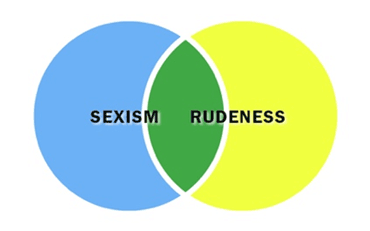A male Walmart supervisor harassed female employees, publicly remarking that "Women are good for nothing." Yet when one of them sued, the court concluded that no gender discrimination had occurred.
What Happened?
The supervisor had unknowingly discovered an easy way to hide his sexism in plain sight: he was simply mean to everybody, men and women alike. Because he was an "equal opportunity jerk," the court found his actions weren't sexist: "The strongest inference that can be drawn from the record," wrote the judge in Dotel v. Walmart Stores, Inc., 2013, "is that the supervisor was rude to all."
When a man makes sexist comments to women, people recognize sexism immediately. But when that same man also behaves offensively to other men, people discount the sexism, or even fail to recognize it at all. Rudeness to all creates the perception that the perpetrator does not notice or pay attention to gender. But such a perception is an illusion. Sexists are perfectly capable of abusing men as well as women.
Gender Blindness versus Gender Bias
To examine the question of how rudeness to men blunts the perception of sexism, my collaborators and I ran a series of studies. First, we asked 2,100 participants to read Tweets written by former President Donald Trump.
When participants saw Trump berating women with sexist comments, they concluded Trump was sexist. But when they also saw Trump berating other men on Twitter, the more they thought he was "gender blind"—that is, they began to think that gender is not a factor in how Trump treats others. Perceptions of gender blindness were associated with perceptions of less sexism.
In another study, participants read about a manager who asked a female employee whether she "left her brain at the salon." When participants only saw his interchange with the woman, they thought this manager was sexist. But when they also read that the manager made rude remarks toward other men, they did not perceive him as sexist.
In a third study, we asked MBA students how they would handle an "equal-opportunity jerk." When participants considered examples of managers being rude to men alongside examples of sexist behavior, they were less likely to suggest those managers receive gender-bias training. Instead, participants thought what they needed was anger-management training.
Sexism Need Not be Mean—And Often Isn't
Examples of sexism that dominate popular culture are generally both sexist and rude, or worse. As a result, it's easy to categorize sexism as a form of meanness or aggression directed at women in particular. But sexism is not just about treating men and women differently. And it's not just an expression of antipathy, a way to be mean to women. Sexism is a set of beliefs and attitudes about the world, a set of false claims about women that harm them in a wide variety of ways.
Examples of such claims are that women are nice but incompetent; that women are unfit for stereotypically masculine jobs; and that women are weak, emotional, and irrational. But though these beliefs are used to subjugate women and create barriers to gender equality, rudeness and aggression are not required to deploy them.
 Men who hold negative stereotypes about women can be—and often are—rude toward other men. In fact, when we consider how sexism relates to rudeness, we realize they are different categories of behavior that sometimes overlap. Seen in this light, it's not surprising that people who are generally inclined to abuse their power deploy sexism as a tool to do so in particular circumstances.
Men who hold negative stereotypes about women can be—and often are—rude toward other men. In fact, when we consider how sexism relates to rudeness, we realize they are different categories of behavior that sometimes overlap. Seen in this light, it's not surprising that people who are generally inclined to abuse their power deploy sexism as a tool to do so in particular circumstances.
Further, sexism doesn't always manifest itself through open expressions of rudeness. And the consequences of sexism are not simply hurt feelings or negative experiences. By conflating sexism and rudeness, we miss less-aggressive forms of sexism, as well as sexism practiced by those who abuse both men and women. To move beyond false and harmful stereotypes, these are too significant for us to ignore.
For Further Reading
Belmi, P., Jun, S., & Adams, G. S. (2022). The "equal-opportunity jerk" defense: Rudeness can obfuscate gender bias. Psychological Science, 33(3), 397–411. https://doi.org/10.1177/09567976211040495
Peter Belmi is the Scott C. Beardsley Associate Professor of Business Administration at the University of Virginia's Darden School of Business. He studies the psychology of inequality.



